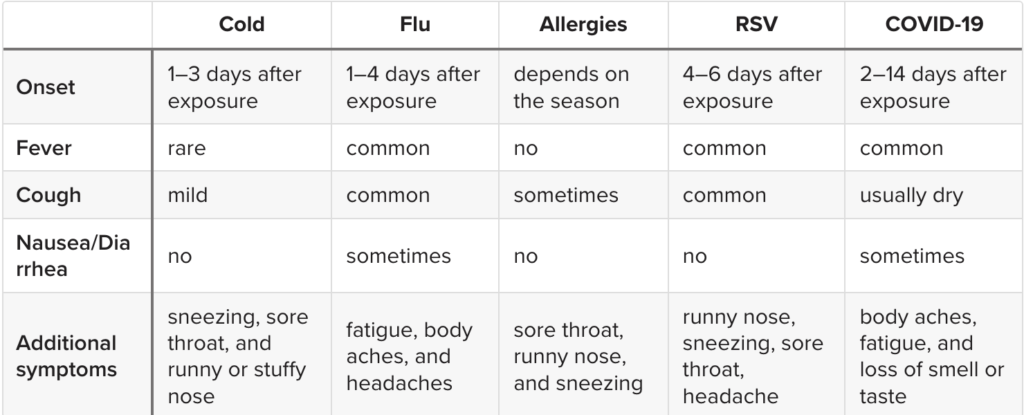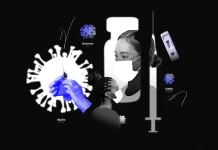
A cough is a distinctive symptom of COVID-19, yet it is also a common indication of various other conditions such as the flu, the common cold, respiratory syncytial virus (RSV), and seasonal allergies.
Understanding the Cough Associated with COVID-19
The cough that often accompanies a COVID-19 infection has key characteristics that differ from common coughs associated with other illnesses.
How it Feels
A COVID-19 cough is typically dry and persistent. It is described as a relentless cough that doesn’t produce mucus (or phlegm) and doesn’t provide relief when you cough. Patients might experience bouts of intense, continuous coughing that can be exhausting.
The sensation can be irritating in the throat, leading to a raw feeling due to the persistent nature of the cough. This dry cough is also often accompanied by a burning sensation in the airways and might exacerbate the discomfort.
How it Sounds
The sound of a COVID-19 cough tends to be distinct from the chesty, productive cough one might have with a cold or flu. Because it’s dry, it doesn’t have the gurgling or rattling sound that mucus in the airways can cause. Instead, it often sounds harsh and sometimes hoarse, especially as the illness progresses and the throat becomes more irritated.
Duration and Severity
The duration of the cough can vary significantly from person to person. While some individuals have reported coughing symptoms for a few days, others have experienced them for weeks. The cough is often worse at night or first thing in the morning, possibly due to laying down, which can exacerbate the sensation and sound.
Other Associated Symptoms
While the cough is a primary symptom of COVID-19, it is usually not alone. Other symptoms that might accompany the cough include:
- Fever or chills
- Shortness of breath or difficulty breathing
- Fatigue
- Muscle or body aches
- Headache
- New loss of taste or smell
- Sore throat
- Congestion or runny nose
- Nausea or vomiting
- Diarrhea
In some cases, individuals with COVID-19 may be asymptomatic, meaning they show no symptoms, yet they can still spread the virus to others.
Conclusion
Identifying the unique characteristics of a COVID-19 cough can lead to earlier detection and testing, which is crucial for self-isolation practices and reducing the spread of the virus. If anyone experiences the symptoms mentioned, especially in combination, they should follow the guidelines laid out by local health authorities, which may include self-isolation and seeking medical advice for testing and care.
Understanding that the situation is continually evolving, it is important to stay informed by referring to reputable sources such as the World Health Organization (WHO) or the Centers for Disease Control and Prevention (CDC) for the latest updates on COVID-19 symptoms and guidelines.
What is the treatment for COVID-19 cough?
The novel coronavirus, known as COVID-19, has been a major global health concern since its emergence in late 2019. A common symptom experienced by many with the virus is a persistent cough, which can vary from mild to severe. Here’s what we know about helping to manage a COVID-19 induced cough.
Identifying a COVID-19 Cough
A COVID-19 cough is typically dry and can be quite relentless. It is more than just an annoying tickle in the throat; it is the body’s response to the viral infection. It’s important to note that this cough is also a primary means through which the virus spreads, emphasizing the importance of mask-wearing and isolation when symptomatic.
Treatment Approaches for COVID-19 Cough
Home Remedies
- Stay Hydrated: Drink plenty of fluids. Water, broth, or herbal tea can help ease the irritation in the throat.
- Honey: A spoonful of honey can coat the throat and soothe coughs. It has natural antibacterial properties and can be mixed with tea or warm water with lemon.
- Steam Inhalation: Breathing in steam from a hot shower or bowl of hot water can help relieve coughing by loosening secretions.
- Humidifier: Using a humidifier to add moisture to the air can help ease coughs and congestion.
Over-the-Counter Medications
- Cough Suppressants: These medicines, like dextromethorphan (found in many cough syrups), may help reduce coughing.
- Lozenges and Cough Drops: These can soothe a sore throat, which may be triggering coughing.
Prescription Medications
- Cough Medication: In some cases, particularly for those with underlying health conditions, a doctor may prescribe a stronger cough suppressant.
- Steroids or Inhalers: For those with severe symptoms or asthma, a doctor may prescribe an inhaler or steroids to reduce inflammation.
When to Seek Professional Help
If you have a cough that is persistent and worsening, or if you’re experiencing shortness of breath, it is crucial to get medical attention. Likewise, if you notice symptoms like a high fever, severe fatigue, or a loss of smell and taste, these warrant a call to your healthcare provider.
Preventing the Spread
While treating the cough is important, preventing transmission is paramount:
- Wearing Masks: This helps prevent the spread of droplets containing the virus.
- Hand Hygiene: Regular hand washing can minimize transmission.
- Physical Distancing: Keeping a safe distance from others reduces the risk of spread.
Vaccination
Getting vaccinated against COVID-19 is one of the most effective ways to prevent the illness and its complications, including cough. Vaccines are widely available and have been shown to reduce the severity of symptoms in those who do contract the virus.
Conclusion
Managing a COVID-19 cough involves a combination of home remedies, over-the-counter medications, and possibly prescription treatments. Good hygiene practices and following public health guidelines are also critical in controlling the spread of the virus. If symptoms persist or worsen, seek medical attention promptly. And remember, getting vaccinated is your best defense against COVID-19.
COVID-19, Flu, Cold, RSV, or Allergies Coughing Chart
The following chart breaks down some common symptoms of conditions that may cause you to cough. This chart may help you if you’re trying to determine whether your cough is due to COVID-19.




